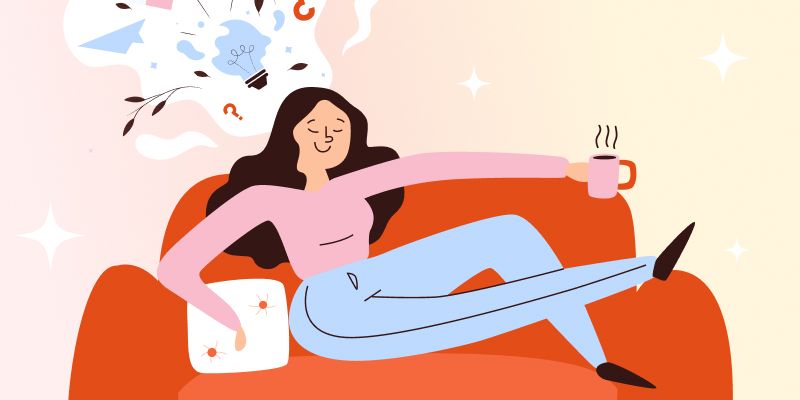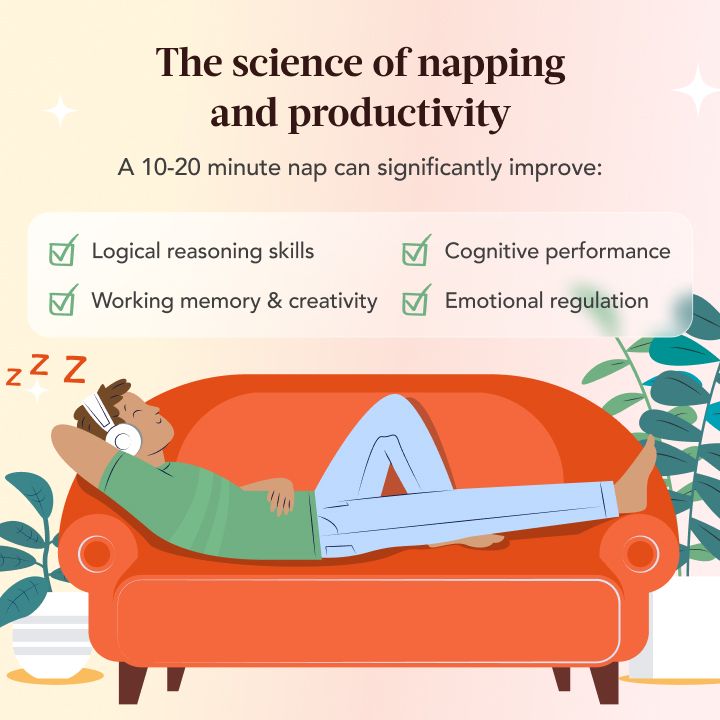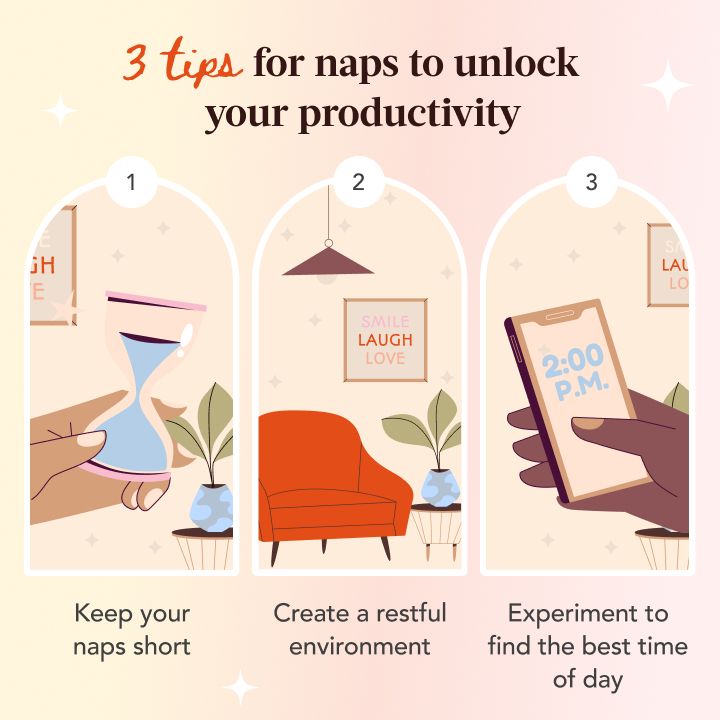How Napping Can Supercharge Your Productivity

When we think of naps, we tend to assume they’re related to laziness or slacking off. But a growing number of studies show that—much like a good night's sleep—naps can be a powerful tool for boosting productivity.
Over the past several decades, researchers from NASA, Harvard, the National Center for Biotechnology Information, and many more around the world, have demonstrated the surprisingly positive impact of napping on cognitive function, learning, memory, and performance.
In this post, we’ll explore the science behind napping and its benefits. We'll also dive into the optimal nap duration, the best timing for naps, and techniques to maximize the effectiveness of your naps. Though they might sound humble, naps really can be a path to uplevelling your productivity and well-being.
The science of napping and productivity
In many professions, getting good sleep is a high-stakes problem. When a decrease in alertness or working memory can not only derail a mission but also threaten lives, there’s a lot on the line.
To that end, NASA has conducted extensive studies on naps to explore their potential benefits. Understanding the effects of napping on alertness, cognitive function, and overall well-being is crucial for ensuring the safety of astronauts during long-duration missions.
Here’s some of the key findings from their work: research conducted by NASA revealed that a 26 minute nap can increase alertness by 54% while simultaneously enhancing cognitive function, including memory, creativity, and logical reasoning skills. In fact, naps are required for astronauts. And if they work for astronauts, why not you too?

A separate study published in the Journal of Sleep Research found that a short nap of 10-20 minutes significantly improved alertness and cognitive performance. Additional research at Harvard has linked napping to gains in learning and memory.
And that’s not all. Naps can have a broadly beneficial impact on both our physical and mental health. According to a study published in the Archives of Internal Medicine, regular napping was associated with a 37% lower risk of coronary mortality in men and women. Other studies have found that napping helps to boost mood, reduce frustration and impulsivity, and even improve overall emotional regulation.
Taken together, these and many additional studies suggest that napping can have a surprisingly wide range of benefits, including increased productivity, improved focus, enhanced cognitive function, better emotional well-being, and significantly reduced health risks.
The next time someone raises an eyebrow at the mention of a nap, remind them that napping isn’t a sign of laziness. Instead, as the research shows, naps should be encouraged as a valuable tool for enhancing productivity and well-being.

3 tips for naps to unlock your productivity
1) Keep naps short
How long you nap for makes a big difference for your outcome. The ideal nap duration is short—aim for between 10 to 20 minutes. Longer naps lead you to drop into deeper sleep stages, but waking up from those deeper sleep stages can result in grogginess and a feeling of tiredness called ‘sleep inertia.’
In some cases, if you’re suffering from a lack of sleep, longer naps may be helpful to address a sleep debt. But in general, keeping naps short limits them to the light, initial stages of sleep, so you’re able to wake up feeling refreshed.
2) The time of day matters
Naps will affect you differently depending on the time of day you take them. As a general rule, aim for an early afternoon nap, as napping after 3pm may interfere with your nighttime sleep schedule.
Experiment with timing your naps based on your individual needs. Incorporating a short nap into your post-lunch dip or mid-afternoon slump can help reduce fatigue and recharge your thinking, leading to better focus, creativity, and overall productivity through your day.
3) Create a restful environment
Our sleep environment play a big role in the quality of our sleep. For an optimal nap, find a quiet and comfortable space where you can relax, and minimize any disturbances. Consider using a sleep mask or curtains to block out light, earplugs or white noise machines to mask noise, and a favorite pillow or blanket to make yourself comfortable. Keeping the room temperature cool can also help to promote a more conducive environment for napping.
A good nap can be a game-changer when it comes to boosting focus, productivity, and overall well-being. Well-timed naps rejuvenate the mind, recharge energy levels, and enhance your cognitive function across the board.
The path to getting maximum benefits from your nap is through moderation, timing, and personal experimentation. Try tailoring your routine to suit your preferences and schedule, and pay attention to what works best for you. Whether it's a short power nap during the day or a longer nap to compensate for sleep debt, listen to your body's signals and adjust accordingly.
In an always-on culture, it can be tough to take a time out. Give yourself permission to pause, recharge, and return to your day with a renewed focus and energy boost. A healthy nap might be just the catalyst you need to propel you to greater productivity and better well-being.

Comments ()